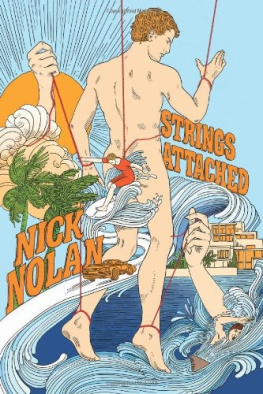Ruth W. Grant - Strings Attached
Here you can read online Ruth W. Grant - Strings Attached full text of the book (entire story) in english for free. Download pdf and epub, get meaning, cover and reviews about this ebook. year: 2011, publisher: Princeton University Press, genre: Politics. Description of the work, (preface) as well as reviews are available. Best literature library LitArk.com created for fans of good reading and offers a wide selection of genres:
Romance novel
Science fiction
Adventure
Detective
Science
History
Home and family
Prose
Art
Politics
Computer
Non-fiction
Religion
Business
Children
Humor
Choose a favorite category and find really read worthwhile books. Enjoy immersion in the world of imagination, feel the emotions of the characters or learn something new for yourself, make an fascinating discovery.

- Book:Strings Attached
- Author:
- Publisher:Princeton University Press
- Genre:
- Year:2011
- Rating:4 / 5
- Favourites:Add to favourites
- Your mark:
- 80
- 1
- 2
- 3
- 4
- 5
Strings Attached: summary, description and annotation
We offer to read an annotation, description, summary or preface (depends on what the author of the book "Strings Attached" wrote himself). If you haven't found the necessary information about the book — write in the comments, we will try to find it.
Strings Attached — read online for free the complete book (whole text) full work
Below is the text of the book, divided by pages. System saving the place of the last page read, allows you to conveniently read the book "Strings Attached" online for free, without having to search again every time where you left off. Put a bookmark, and you can go to the page where you finished reading at any time.
Font size:
Interval:
Bookmark:
Strings Attached
Untangling the Ethics of Incentives
Ruth W. Grant

Copyright 2011 by Russell Sage Foundation and Princeton University Press
Published by Princeton University Press, 41 William Street,
Princeton, New Jersey 08540
In the United Kingdom: Princeton University Press, 6 Oxford Street,
Woodstock, Oxfordshire OX20 1TW
press.princeton.edu
Russell Sage Foundation, 112 East 64th Street,
New York, New York 10065
russellsage.org
Jacket photograph: courtesy of and Ivosar/Shutterstock
All Rights Reserved
Library of Congress Cataloging-in-Publication Data
Grant, Ruth Weissbourd, 1951
Strings attached : untangling the ethics of incentives / Ruth W. Grant.
p. cm.
Includes bibliographical references and index.
ISBN 978-0-691-15160-1 (hardcover : alk. paper)
1. Incentive (Psychology) 2. Motivation (Psychology) 3. Political psychology.
4. Political ethics. I. Title.
JA74.5.G73 2011
170dc22
2011011921
British Library Cataloging-in-Publication Data is available
This book has been composed in Sabon Lt std
Printed on acid-free paper.
Printed in the United States of America
1 3 5 7 9 10 8 6 4 2
To Steve
THE IDEA FOR THIS PROJECT was born during an undergraduate seminar in ancient Greek political philosophy. The students were exploring the circumstances under which coercion, or force, might be ethically superior to persuasion. That possibility ran counter to their usual assumptions. How often had they been told as youngsters to use your words instead of hitting or pushing or grabbing? The assigned reading for that day was the opening scene of Sophocles Philoctetes. Philoctetes is in possession of Achilles bow, which the Greeks must have in order to defeat the Trojans. Odysseus, always the clever one, is attempting to persuade the noble young son of Achilles, Neoptolemus, to help him retrieve the bow by means of a deceitful scheme. Neoptolemus resists the use of such shameful tactics, saying,
I have a natural antipathy to get my ends by tricks and strategems... Philoctetes I will gladly fight and capture, bring him with us, but not by treachery.
For Neoptolemus, force is more honorable than fraud as a means of attaining ones goals.
And then someone asked, What about incentives? Wouldnt that be an alternative way of getting Philoctetes to relinquish the bow? Here was an interesting possibility; and even more interesting, it was a possibility that was not included in the play. Why not? Did the Greeks not understand that everyone has his price? Or, on the contrary, did they understand the limits to that saying better than we do? It is unlikely that an incentive would have worked with Philoctetes. Bargaining is not always an effective mode of influence. Resentment, pride, and a sense of honor all would prevent a successful negotiation in this case. One would expect that Philoctetes would not yield at any price. Indeed, acting honorably might be understood precisely as holding fast to those things that must be defended at any cost. Bargaining, like coercion and persuasion, involves ethical considerations too, it seems.
For whatever reason, the play does not include offering incentives as one possible approach to the problem of retrieving Achilles bow. Instead, the possibilities are presented in terms of the dichotomy between speech and deed, persuasion and force. To be sure, persuasion includes explaining to Philoctetes the relative advantages and disadvantages of the choice he faces later in the play. If he relinquishes the bow and goes to Troy, certain things will follow as a matter of course: for example, he will have access to medical care for his wounded foot. But this is the natural consequence of a certain decision, not an incentive added as an inducement to make that decision.
I walked out of class thinking about incentives in a different way than I had before. Incentives now appeared as one kind of power separate from coercion and persuasion, and I found myself wondering how to judge the ethics of employing one kind rather than another. When is the use of force legitimate? What sorts of persuasion are illegitimate? How can legitimate uses of incentives be distinguished from illegitimate onesbribery or blackmail, for example?
It is this last question that became the central question of this book. And the framework for my investigation has remained unchanged since that first day. By this I mean that incentives are construed as an exercise of power throughout the book. They are one of the means employed to get people to do what they otherwise would not. And incentives, like all kinds of power, are subject to abuse. This understanding brings the ethical issues involved with the use of incentives to the fore much more effectively than the alternative approach, according to which incentives are understood in the same terms as any other form of trade.
Many ideas may occur to a writer, but few grab you enough to stick with them through the process of writing a book. When they do, it is generally because they engage not only ongoing intellectual interests but also ongoing personal ambivalences and intersecting concerns. One day, while working on this book, a childhood memory came back to me. I was shopping with my mother in Marshall Fields department store in Chicago. The saleslady was very attentive, and we took some clothes into the dressing room to try on. As we did so, the saleslady said, Remember, my name is Betty. In my navet, I thought that all of this was very nice. My mothers reaction was not so positive, and she explained to me that the salesladies worked on commission, a situation that pitted them against their fellow workers and encouraged them to flatter us. Betty would only receive her commission on the sale if we remembered to seek her out so that she could be the one to ring up the sale at the cash register. I recognize now in my mothers remarks a distant echo of the labor union attitudes toward incentives that first developed when incentives were introduced in the early twentieth century as part of a move toward scientific management in American industry. That story is briefly sketched in .
In my case, the intellectual issue of ethics and incentives, once it had surfaced in the Philoctetes class, reverberated with my own experience: with my own sense of manipulation in certain situations where incentives were deployed; with my observation of the tensions between individual incentives and the cooperative spirit within institutions; and with my longstanding concerns about the use of incentives in education and child rearing. I found, for example, that people became more reluctant to pitch in in the workplace for the common benefit once it became the usual practice to offer some kind of bonus for any extra duty. I wondered what kind of lesson my child was learning from the teacher who gave extra credit on spelling tests to children who did not ask to use the bathroom. On account of a variety of experiences like these, the issue had been on my mind in one form or another for quite awhile, and this project took hold.
As I worked on this book, the very large philosophical questions of the possibility of ethical reasoning and the grounds of ethical judgment increasingly nagged in my ear. The book is meant to persuade the reader that there are certain ethical standards by which the use of incentives ought to be judged. Where do those standards come from? Do they apply across cultures? What counts as a good argument in matters of ethical judgment? What does it mean to have good judgment and how does one acquire it? Is knowledge possible in this area, or must ethical judgments necessarily be made in the absence of certainty and without conclusive demonstration?
Next pageFont size:
Interval:
Bookmark:
Similar books «Strings Attached»
Look at similar books to Strings Attached. We have selected literature similar in name and meaning in the hope of providing readers with more options to find new, interesting, not yet read works.
Discussion, reviews of the book Strings Attached and just readers' own opinions. Leave your comments, write what you think about the work, its meaning or the main characters. Specify what exactly you liked and what you didn't like, and why you think so.







